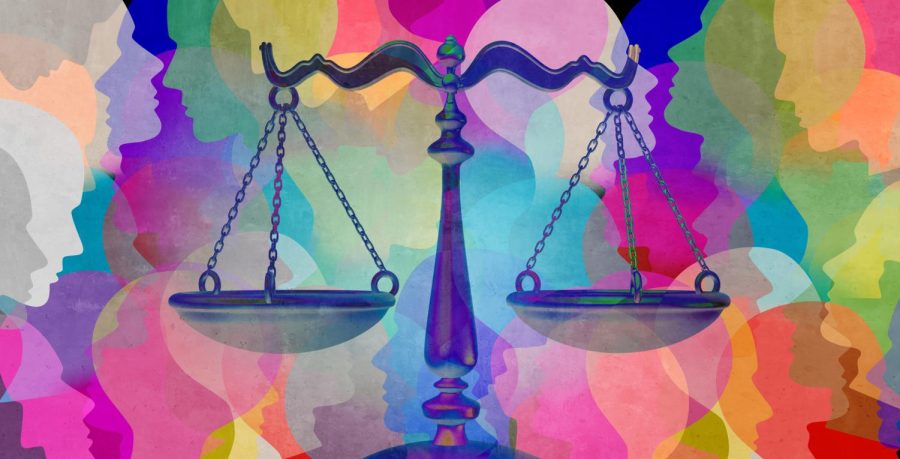LGBTQ+ people deserve better federal protection
A crowd of faces with multiple different colors with the social justice scale symbol. Columnist Emily Beebe believes the LGTBQ+ community deserves more legal protection when it comes to their rights in the U.S.
April 10, 2023
The LGBTQ+ community has long been marginalized and discriminated against. It’s time for society to recognize that these individuals deserve better rights.
According to the ACLU, there have been several legislations introduced that protect members of the LGBTQ+ community. An example of this is L.B. No. 120 in Nebraska, which prohibits discrimination based on gender identity and sexual orientation. The bill was introduced but indefinitely postponed.
However, there has also been legislation introduced that goes against LGBTQ+ rights and does not offer the protection that LGBTQ+ individuals deserve, especially in the aspect of healthcare.
Sophomore special education major Olivia Kalter, who is bisexual, explains that she has seen a lot of social media posts about new legislation that has been introduced.
“I’ve definitely seen a lot of posts on social media regarding transgender-affirming care and a lot of limits placed upon them, especially in the Southern states and also banning drag shows and drag performances,” Kalter said.
There has been new legislation introduced all over the United States, but especially in Southern states such as Texas, Tennessee and North Carolina. These potential laws target drag shows, gendered bathrooms and gender-affirming health care.
For example, H.B. No. 4378 – introduced in Texas – would allow citizens to sue anybody who hosts or performs in drag where a minor is in attendance.
On March 13, the Tennessee General Assembly passed S.B. No. 1440 which defines sex as a person’s biological sex assigned at birth. This bill goes against the LGBTQ+ community, because everyone would have to go by their sex assigned at birth, even though that may not be what they are comfortable with.
Sophomore history major Angel Ramirez, who is transgender, explains how S.B. No. 1440 has negatively affected people in the LGBTQ+ community when it comes to medical rights.
“It is leaving a negative impact in LGBTQ+ medical rights and most importantly human rights by taking away very necessary medical procedures and medicine for trans people,” Ramirez said.
All of this legislation affects people in the LGBTQ+ community and those outside of the community.
For example, bill H.B. No. 2546, which was introduced in Oklahoma, bans classroom instruction on LGBTQ+ topics from kindergarten through fifth grade. Teachers want to teach students about the LGBTQ+ community depending on age and grade level. According to EdWeek, teacher Alex Parker wanted to explain to his students more about the LGBTQ+ community and the rainbow flags.
Even though there is a lot of anti-LGBTQ+ legislation being introduced or passed, there is some good legislation that has been passed that prohibits discrimination against the LGBTQ+ community.
As citizens, we can protect LGBTQ+ supportive legislation by promoting it on social media and also by being more supportive of people in the LGBTQ+ community.
Sophomore business management major Madigan Balfe, who is a lesbian, explains that we as human beings can make some real change in the world. One major way is by educating people about the LGBTQ+ community.
“Stop being scared of political conversations with people that may not agree with you. The only way we’ll ever progress is by breaking down barriers and having uncomfortable conversations,” Balfe said.
We have the power to make real and impactful change in the world, and it starts by contacting your state representatives and voting in elections, local and national.
LGBTQ+ people deserve better protection and should not have to be fearful for their safety. LGBTQ+ people deserve to have basic human rights.



